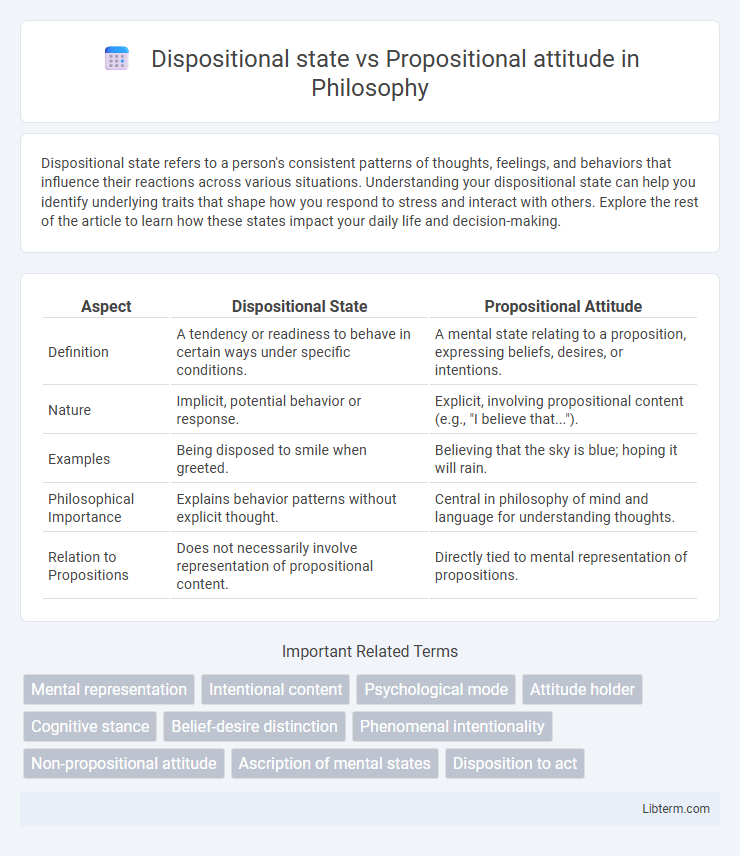Dispositional state refers to a person's consistent patterns of thoughts, feelings, and behaviors that influence their reactions across various situations. Understanding your dispositional state can help you identify underlying traits that shape how you respond to stress and interact with others. Explore the rest of the article to learn how these states impact your daily life and decision-making.
Table of Comparison
| Aspect | Dispositional State | Propositional Attitude |
|---|---|---|
| Definition | A tendency or readiness to behave in certain ways under specific conditions. | A mental state relating to a proposition, expressing beliefs, desires, or intentions. |
| Nature | Implicit, potential behavior or response. | Explicit, involving propositional content (e.g., "I believe that..."). |
| Examples | Being disposed to smile when greeted. | Believing that the sky is blue; hoping it will rain. |
| Philosophical Importance | Explains behavior patterns without explicit thought. | Central in philosophy of mind and language for understanding thoughts. |
| Relation to Propositions | Does not necessarily involve representation of propositional content. | Directly tied to mental representation of propositions. |
Understanding Dispositional States: A Definition
Dispositional states refer to the inherent tendencies or capacities of an individual to exhibit certain behaviors under specific conditions, such as a person's tendency to feel anxious in social situations. Propositional attitudes, by contrast, involve mental states that relate to a proposition, like believing or hoping that a particular statement is true. Understanding dispositional states involves recognizing them as latent behavioral potentials rather than explicit beliefs or judgments about facts.
Propositional Attitudes: Key Concepts and Examples
Propositional attitudes are mental states that involve a relation between an individual and a proposition, typically expressed through verbs like "believe," "desire," or "hope." These attitudes are characterized by their intentionality, meaning they are about something, such as believing that it will rain or hoping for a promotion. Key examples include believing that the earth orbits the sun, desiring to travel, and fearing failure, all of which attribute specific propositional content to the individual's mental state.
Dispositional State vs. Propositional Attitude: Core Differences
Dispositional states refer to inherent tendencies or capacities to respond in certain ways under specific conditions, such as a person's disposition to feel anxious in social settings. Propositional attitudes involve mental states that relate to propositions, such as believing, hoping, or fearing that a particular statement is true or false. The core difference lies in dispositional states being potential or latent behaviors, while propositional attitudes explicitly engage with content-bearing mental representations about the world.
Psychological Foundations of Dispositional States
Dispositional states are inherent tendencies or capacities within an individual, reflecting underlying psychological structures that predict behavior across various contexts, while propositional attitudes represent explicit mental states directed toward specific propositions, such as beliefs or desires. Psychological foundations of dispositional states involve the cognitive and affective mechanisms that enable stable, context-independent behavioral dispositions, including personality traits and habitual responses. Research in cognitive psychology and personality theory emphasizes the neurobiological correlates and environmental interactions shaping these enduring psychological dispositions.
Linguistic Markers of Propositional Attitudes
Propositional attitudes are mental states expressed through linguistic markers such as verbs like "believe," "desire," "hope," or "fear," which introduce a proposition reflecting the subject's attitude toward a specific content. Unlike dispositional states that refer to enduring tendencies or capacities not necessarily expressed in language, propositional attitudes are explicitly represented in language by intensional contexts involving that-clauses or infinitives. The presence of these markers in sentence structures signals the cognitive or affective stance of the subject toward the proposition conveyed.
Philosophical Perspectives: Disposition vs. Attitude
Dispositional states refer to inherent tendencies or capacities to behave in certain ways under specific conditions, while propositional attitudes involve the mental states that relate to particular propositions, such as beliefs, desires, or intentions. Philosophical perspectives highlight that dispositional states are often characterized by potential behaviors grounded in causality, whereas propositional attitudes are defined by their content and representational role in relation to truth values. This distinction underpins debates in philosophy of mind regarding the nature of mental states, emphasizing the difference between latent behavioral dispositions and explicit cognitive stances toward propositions.
Cognitive Implications in Everyday Judgments
Dispositional states refer to latent tendencies to respond in certain ways under specific conditions, while propositional attitudes involve explicit mental states about propositions, such as beliefs or desires. Cognitive implications in everyday judgments show that dispositional states influence spontaneous, automatic responses, whereas propositional attitudes guide deliberate reasoning and decision-making processes. Understanding the interplay between these states helps explain variability in human judgment, particularly in situations involving implicit biases versus reflective evaluations.
Impact on Behavior and Decision-Making
Dispositional states, such as habitual tendencies or innate traits, influence behavior by predisposing individuals to act consistently across situations, often subconsciously guiding decision-making patterns. Propositional attitudes, which include beliefs and desires about specific propositions, directly shape choices by providing explicit representational content that informs reasoning and goal-directed behavior. Together, these mental constructs interact to determine the complexity and context-sensitivity of human actions and decisions.
Dispositional and Propositional in Artificial Intelligence
Dispositional states in artificial intelligence refer to the potential behaviors or responses an AI system can exhibit in given situations without explicit representation, relying on underlying programming or learned tendencies. Propositional attitudes involve explicit mental states attributed to an AI, such as beliefs or desires, represented through structured data that can be reasoned about and manipulated. Understanding the distinction enhances AI modeling by balancing implicit behavioral capacities with explicit cognitive representations for more robust decision-making frameworks.
Future Research Directions in Mental State Theory
Future research in mental state theory should explore the nuanced distinctions between dispositional states and propositional attitudes to refine the understanding of cognitive representations. Advancements in neuroimaging techniques can provide empirical data linking specific brain activity patterns to these mental states, offering insights into their underlying mechanisms. Integrating interdisciplinary approaches from philosophy, psychology, and neuroscience will enhance theoretical models and support the development of more precise semantic frameworks for mental states.
Dispositional state Infographic

 libterm.com
libterm.com